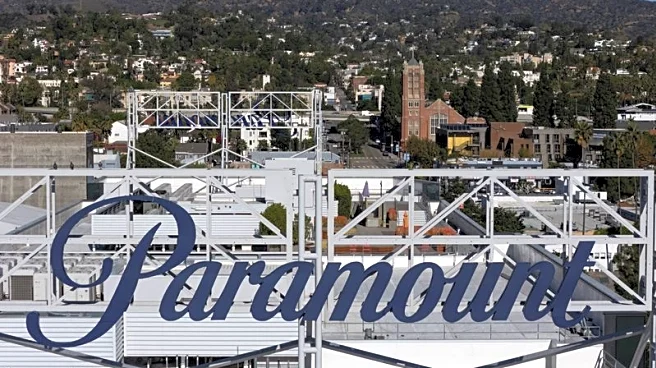What's Happening?
Aziz Ansari makes his writing-directing feature debut with 'Good Fortune,' a comedy that tackles the gig economy and economic inequality. The film stars Ansari alongside Seth Rogen and Keanu Reeves, who
plays an angel named Gabriel. Set in Los Angeles, the story follows Arj, a struggling Hollywood film editor living out of his car, who gets a chance to work for a wealthy venture capitalist, Jeff, played by Rogen. The film blends elements of celestial stories and body-swap comedies, aiming to critique the obliviousness of the wealthy and the desperation of the have-nots. Despite its comedic elements and a strong performance by Reeves, the film struggles to balance its satirical jabs with sentimentality.
Why It's Important?
The film 'Good Fortune' is significant as it addresses the pressing issue of economic inequality in the United States, particularly highlighting the challenges faced by those in the gig economy. By using comedy to explore these themes, the film attempts to make the topic more accessible and engaging for a broader audience. The involvement of high-profile actors like Keanu Reeves and Seth Rogen also brings attention to the film, potentially sparking conversations about wealth disparity and the societal structures that perpetuate it. The film's approach to these issues reflects a growing trend in Hollywood to tackle real-world problems through entertainment.
What's Next?
As 'Good Fortune' enters wide release, its reception by audiences and critics will likely influence future projects that aim to address social issues through comedy. The film's performance at the box office and its impact on public discourse could encourage more filmmakers to explore similar themes. Additionally, the film may prompt discussions among policymakers and social commentators about the gig economy and economic inequality, potentially influencing future policy decisions.
Beyond the Headlines
The film's exploration of economic inequality through a comedic lens raises questions about the role of entertainment in social commentary. It challenges the traditional boundaries of comedy by addressing serious issues, which could lead to a broader acceptance of films that blend humor with social critique. This approach may also influence the cultural perception of wealth and success, encouraging audiences to reflect on their own views and the societal norms that shape them.










